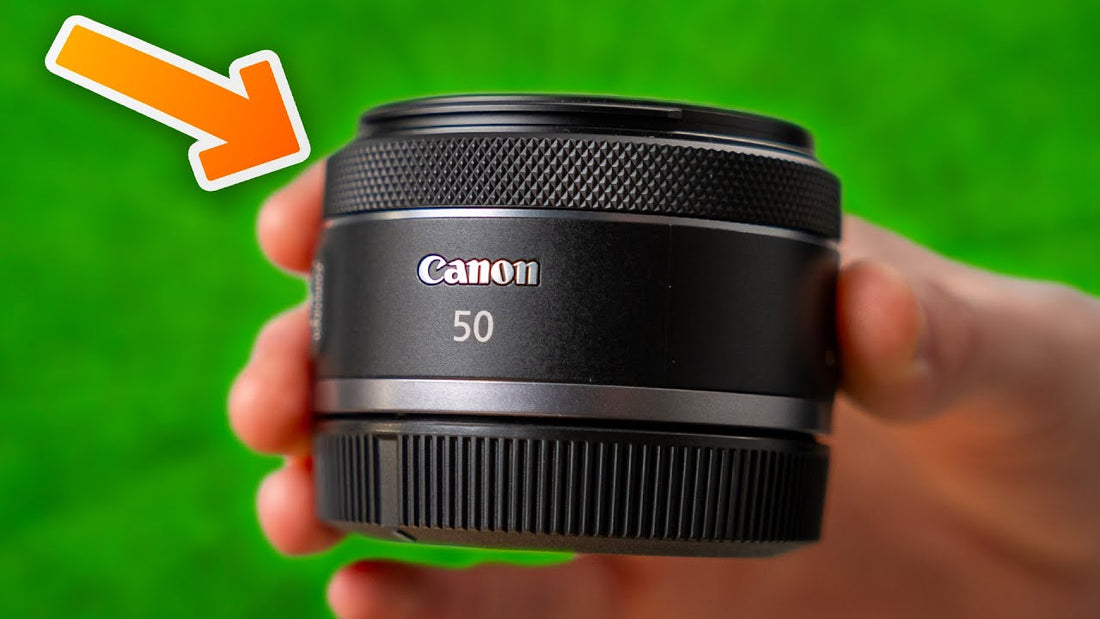
Canon RF 50mm f/1.8 | The Perfect First Lens for R50, R7, R10, & R100
Check out my full video HERE
This post contains affiliate links. If you click and make a purchase, I may earn a commission at no extra cost to you. Thanks for your support!
Introduction
If you own (or plan to own) a Canon APS-C RF camera like the R50, R7, R10, or R100, one of the most affordable and versatile lenses you can add to your kit is the Canon RF 50mm f/1.8. Though originally designed for full-frame RF cameras, this lens works exceptionally well on crop bodies too, effectively giving you an ~80mm portrait focal length. Below, we’ll explore its features, pros, cons, and who it’s best suited for.
Key Specs & Features
- Focal Length: 50mm (equivalent to ~80mm on APS-C)
- Aperture: f/1.8 maximum—ideal for background separation and low-light shooting
- Construction: Mostly plastic build (5.6 oz), but with a metal lens mount
- Minimum Focus Distance: ~11.8 inches, allowing for relatively close-up shots
- Control Ring/Focus Ring Combo: Single ring can function as either control or focus ring; no dedicated AF/MF switch
- Price: Usually around $180, making it the least expensive autofocus RF lens from Canon
Why It’s Great for Canon APS-C Cameras
-
Portrait-Friendly Focal Length:
- On APS-C bodies, 50mm becomes ~80mm, hitting a sweet spot for portraits, headshots, and product photography.
- Gets you tighter framing than the standard kit lens, which usually tops out around 45mm.
-
Wide Aperture (f/1.8):
- Lets in plenty of light for indoor or evening shoots, reducing the need for high ISO.
- Yields dreamy bokeh and subject separation, perfect for those shallow depth-of-field shots.
-
Light & Compact:
-
Easy Upgrade from Kit Lens:
- If you own a kit lens (e.g., 18–45mm on APS-C), the 50mm f/1.8 offers a more creative lens for portraits, low-light, and shallow DOF.
- At $180, it’s among the most affordable ways to experiment with faster apertures.
Pros & Cons
Pros
- Superb Value: One of the cheapest ways to achieve that classic “nifty fifty” look on APS-C.
- Great Image Quality: Sharp enough for most uses, especially when stopped down a bit to f/2.8.
- Compact & Lightweight: Hardly notice it on smaller cameras like the R50 or R100.
- Bright Aperture for Low Light: f/1.8 helps reduce noise by allowing lower ISO settings.
Cons
- No Dedicated AF/MF Switch: Must switch focus modes via the camera menu—slower to toggle quickly.
- Plastic Build & Not Weather-Sealed: Feels solid for the price, but lacks robust sealing or premium finish.
- Slight Softness at f/1.8: Corners and edges can be a touch soft wide open—but typical for an entry-level fast prime.
Who Should Buy It?
- Beginner Photographers: Perfect first upgrade from the kit lens to explore portraiture and low-light shooting.
- Budget-Conscious Creators: Want that shallow-depth-of-field “look” without spending $300+ on other RF primes.
- Portrait & Product Shooters: 80mm effective focal length is ideal for capturing flattering portraits or crisp product photos.
Who Might Skip It
- Need Weather Sealing: Look for higher-end L-series primes or third-party sealed options.
- Video Vloggers: If you mostly shoot wide, a 50mm on APS-C may feel too tight for handheld vlogging.
Conclusion
For around $180, the Canon RF 50mm f/1.8 is arguably the best “nifty fifty” you can buy for Canon’s APS-C mirrorless cameras. It’s an affordable gateway to fast-aperture photography, delivering pleasing bokeh, strong low-light performance, and a great portrait focal length. If you want a small, lightweight lens that can elevate your portraits, product shots, and general photography, look no further than this humble 50mm prime.
